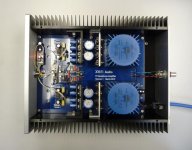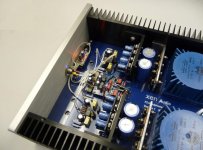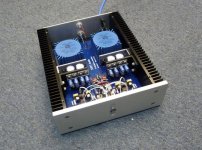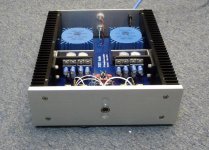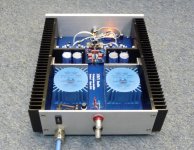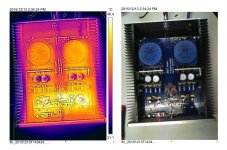HI all .
Can U upload all docu. for the F5HA in 1 document or zip .
Sry for my english but i just looking headphone amp in class A .
Can U upload all docu. for the F5HA in 1 document or zip .
Sry for my english but i just looking headphone amp in class A .
Thank you for your interest.
The Beta tester will start a build thread to describe his experience before X'mas.
And we'll then publish a comprehensive PDF description.
But there is still no substitute of reading through the thread for all the background information.
Unless you want to take short cuts, then you should at least read :
http://www.diyaudio.com/forums/pass-labs/271926-f5-headamp-3.html#post4315990
Patrick
The Beta tester will start a build thread to describe his experience before X'mas.
And we'll then publish a comprehensive PDF description.
But there is still no substitute of reading through the thread for all the background information.
Unless you want to take short cuts, then you should at least read :
http://www.diyaudio.com/forums/pass-labs/271926-f5-headamp-3.html#post4315990
Patrick
I study all post very slowly ;/ but i have 1q -schematic from post 2 is clear class a or ab ? Beacause i wana class a for my headphones.
Aleph is just like my dream
Aleph is just like my dream
Not to be outdone by Cloud85 (the Beta Tester), I finally finished my second F5-HA today.
It will settle in it new home in a couple of days, with a very happy and thrilled new owner.
🙂
Patrick
.
It will settle in it new home in a couple of days, with a very happy and thrilled new owner.
🙂
Patrick
.
Attachments
woooooo!
I like it!!
A question Patrick. What kind of preamp you use? I don´t know much about the F5 design but I would like use a passive preamp (a pot and an input selector... your board have a location for a pot) and use a single chassis, but I´m not sure that it will be ok.
What do you think? use a passive preamp (like a B1) or use an active design? I would like something simple but effective.
I like it!!
A question Patrick. What kind of preamp you use? I don´t know much about the F5 design but I would like use a passive preamp (a pot and an input selector... your board have a location for a pot) and use a single chassis, but I´m not sure that it will be ok.
What do you think? use a passive preamp (like a B1) or use an active design? I would like something simple but effective.
Last edited:
I do not use an extra preamp, and the F5-HA has a normal RCA input that takes 2Vrms signal.
As you can see from my photos and those of Cloud85 at the build thread :
http://www.diyaudio.com/forums/pass-labs/283387-f5-ha-build-thread.html
the incoming signal goes through a cross feed buffer (optional and can be by-passed).
This contains a passive cross feed filter, followed by a JFET source follower buffer (call it B1 if you have to).
The volume control comes after the (optional) cross feed buffer.
The PCB allows for an ALPS RK27 pot at the front (centre), and you can also make a TKD or similar to fit if you move it offboard.
Or you can use an LDR volume as I did.
I guess if you have to, you can fit a rotary source selector switch at the back along the centre line.
And you connect that to a knob at the front through a long shaft between the tranformers, and above the cross feed buffer.
You will then need to move the pot to the side, or use LDR.
The pot for the LDR is at front left, and you can just see the hidden hand wheel bottom left of the front panel.
If none of the above suits your needs, then you are better off building it from scratch with Vero boards, rather than using this PCB layout.
One can only make allowance for so many configurations without compromising performance.
But thank you for your interest,
Patrick
As you can see from my photos and those of Cloud85 at the build thread :
http://www.diyaudio.com/forums/pass-labs/283387-f5-ha-build-thread.html
the incoming signal goes through a cross feed buffer (optional and can be by-passed).
This contains a passive cross feed filter, followed by a JFET source follower buffer (call it B1 if you have to).
The volume control comes after the (optional) cross feed buffer.
The PCB allows for an ALPS RK27 pot at the front (centre), and you can also make a TKD or similar to fit if you move it offboard.
Or you can use an LDR volume as I did.
I guess if you have to, you can fit a rotary source selector switch at the back along the centre line.
And you connect that to a knob at the front through a long shaft between the tranformers, and above the cross feed buffer.
You will then need to move the pot to the side, or use LDR.
The pot for the LDR is at front left, and you can just see the hidden hand wheel bottom left of the front panel.
If none of the above suits your needs, then you are better off building it from scratch with Vero boards, rather than using this PCB layout.
One can only make allowance for so many configurations without compromising performance.
But thank you for your interest,
Patrick
Last edited:
Nice work Patrick! I'm sure your friend will be as pleased as I do.
For those looking to build this amp, I will highly recommend using LDR volume control 🙂
For those looking to build this amp, I will highly recommend using LDR volume control 🙂
We tested this example yesterday with the XEN team members in Hong Kong for a few hours.
Even only using a laptop headphone output jack as music source, and with no burn-in, the sound was immediately impressive.
One comment was "I hear details that was never there before".
Headphones used for the test were AKG K501 and AKG K701.
Some more test in a couple of days with HD650, about which Cloud85 already reported.
And at least three more examples will be built in the next months.
Not bad for a 4-FET circuit. 🙂
Patrick
Even only using a laptop headphone output jack as music source, and with no burn-in, the sound was immediately impressive.
One comment was "I hear details that was never there before".
Headphones used for the test were AKG K501 and AKG K701.
Some more test in a couple of days with HD650, about which Cloud85 already reported.
And at least three more examples will be built in the next months.
Not bad for a 4-FET circuit. 🙂
Patrick
Gogowatch tried out his new toy (IR camera).
Picture taking after 1 hour running.
Only the JFETs were lightly warm to hand.
The case and the heat sinks were barely above room temperture.
Patrick
.
Picture taking after 1 hour running.
Only the JFETs were lightly warm to hand.
The case and the heat sinks were barely above room temperture.
Patrick
.
Attachments
Last edited:
Is that a special heat detecting camera?Gogowatch tried out his new toy (IR camera).
Picture taking after 1 hour running.
Only the JFETs were lightly warm to hand.
The case and the heat sinks were barely above room temperture.
Patrick
.
Or just an app on a smart mobile phone that has some infra red capability?
I have been asked by PM about the cost of building the F5-HA.
Actually Cloud85 is the best person to ask, since he acquired everything from scratch.
And a lot depends on how much you have to pay to get matched devices (self matching, group matching, etc.).
It also depends on which configuration, what components (including encloure),...... etc.
But I guess you should be looking at 500 Euros minimum, for a serious build.
Patrick
Actually Cloud85 is the best person to ask, since he acquired everything from scratch.
And a lot depends on how much you have to pay to get matched devices (self matching, group matching, etc.).
It also depends on which configuration, what components (including encloure),...... etc.
But I guess you should be looking at 500 Euros minimum, for a serious build.
Patrick
I have been asked by PM about the cost of building the F5-HA.
Actually Cloud85 is the best person to ask, since he acquired everything from scratch.
And a lot depends on how much you have to pay to get matched devices (self matching, group matching, etc.).
It also depends on which configuration, what components (including encloure),...... etc.
But I guess you should be looking at 500 Euros minimum, for a serious build.
Patrick
The F5-HA mouser project file with recommended parts cost around SGD 150. This excludes the talema transformers, matched LDRs, LDR pot, matched FETs(2SJ74/SK170, Fairchild devices) chassis and PCBs.
Around €500 euros is a good estimate if you match alone. Your cost will be lowered if you can group match devices. As mentioned in build thread , 30 pairs of Fairchild yields 3 matched pairs for me.
Thanks for the info.
The amp was delivered to it new owner today.
A VERY happy new owner.
🙂
Patrick
The amp was delivered to it new owner today.
A VERY happy new owner.
🙂
Patrick
- Home
- Amplifiers
- Pass Labs
- F5 Headamp ?
